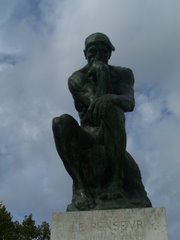This book had been recommended by a number of Ministers I
respect, so I picked up a copy and read it over the Thanksgiving Holiday. It was one of two fiction books I have read
this year. With reading so much for
sermon preparation in mind, I tend to read more theological/religous oriented books. I can count on both hands the number of
fiction books I have read since entering Ministry. (for the record, prior to
ministry I was an avid fiction reader, particularly fond of the spy and science
fiction genres. I am commited to reading more fiction in my life!!) So now when I do read fiction, I really want
to make sure it is going to be something I will enjoy!!
Gilead is a pullitzer
prize winner by Marilynne Robinson. Set
in a rural Iowa it is a dieing Ministers reflection on his life and his
vocation to be shared in later years with his young child. Although the book flows well it has a few
slow patches. Just like our lives have a
few slow patches. It is a thoughtful
book. I think it would be more
appreciated by ministers who might see a bit of themselves, or probably moreso
a commonality of feelings about the vocation itself. I also think it is appealing to people who
live in a rural environement. The
protagonist says “And I knew what hope it was. It was
just that kind the place was meant to encourage, that a harmless life could be
lived here unmolested.” And yet, we know that no place provides a harmless life. And such a place creates a homogenous environment that is not
safe for outsiders. Still we all seek at
least metaphorically or a state of mind that is harmless. The story told the beauty of doing
the small thing just for the sake of doing it and recognizing the beauty in
that. It also touches on the balance of
staying in a safe place and going beyond it. How sometimes we have to leave to
become who we were meant to be, or to create a new vision for ourselves. Yet ultimately we have to find a place we can
call home. The book did not sugarcoat
ministry by any means. It showed the
challenges, uncertainties and struggles of it.
It also showed the wonder and fulfillment of ministry. After providing
care to someone he’d known as a child the protagonist said “Id have gone through seminary and
ordination an all the years interveing for that one moment” I think every minister can relate to that.
If
you like action books, this one is not for you.
But if you like to see a slice of life of rural minister it is a
balm.
